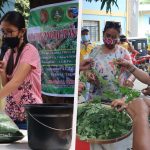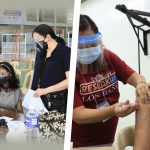In relation to its continued webinars and upskilling programs for faculty members on the use of the Learning Management System, last August 19, 2021, TLRC conducted “sana oL May high Score” training that delved into the utilization of the LMS gradebook in order for teachers to provide an efficient and systematic feedback system for assignments and other requirements of students.
Category: LOS BAÑOS
During the most recent webinar organized by the University of the Philippines titled “Hospital Design: Nakakatulong ba sa Pandemya,” under its “Stop: Covid Deaths” series, Dr. Gerardo “Gap” Legaspi, PGH Director, said they now intend to use their experience with Covid-19 as preparation for future pandemics.
DOST Secretary Fortunato “Boy” T. de la Peña said ACTICon, which was developed by the University of the Philippines Los Banos-National Institute of Molecular Biology and Biotechnology (UPLB-BIOTECH) through the agency’s funding support, was piloted in Davao del Norte to determine its effect as biocontrol agent against Fusarium wilt (FocTR4) in Cavendish banana.
The global pandemic has pushed to the fore concerns on food security, uncertainty of vegetable supply, and state of food insecurity of vulnerable populations.
A project of the Institute of Plant Breeding (IPB) sought to address these concerns and the current popularity of gardening as a hobby became the perfect vehicle with which to promote the initiative.
The UP Professional School for Agriculture and the Environment (UP PSAE) conducted a series of online activities to highlight the need to promote and sustain both agriculture and the environment.
UPLB launched its Program for Zoonotic Diseases (or zoonoses) as the world celebrated the sixth annual One Health Day on Nov. 3.
Collaboration, multi-sectoral approaches to public health, and the inseparability of human, animal, and environmental health were the dominant themes in the two-hour event held via video conference.
UP President Danilo L. Concepcion, in a written message, acknowledged past research on zoonotic diseases and their contribution to our understanding of animal and human safety today.
The College of Engineering and Agro-industrial Technology (CEAT) is going to conduct the “Faculty Training on Technopreneurship” on the Fridays of November.
The training will be conducted to develop capabilities of the faculty on mentoring students about entrepreneurship to promote innovation and technologies developed in the fields of specialization.
Two batches of first year students have already registered in UPLB during the pandemic and most, if not all of them, have not even stepped foot inside the UPLB campus.
They must be raring to go to UPLB. And so does the Office of the Vice Chancellor for Student Affairs (OVCSA).
The Office of Student Housing (OSH) and Office of Student Activities (OSA), which are both under the OVCSA, launched on Oct. 28 the “Open House: Easing Up on Life at Home,” a webinar series to foster the spirit of community and belongingness among students and bring the rich and diverse UPLB culture to every Isko and Iska in the comfort of their homes.
The UPLB Learning Resource Center (LRC) conducted the UPLB Recruitment Program for the Best and the Brightest (RPBB) in three Philippine Science High School (PSHS) campuses, namely: PSHS Ilocos Region Campus on Oct. 7; PSHS Southern Mindanao Campus on Oct. 14; and the PSHS Cagayan Valley on Oct. 29.
UPLB continues to assist the Los Baños municipal government after it began the next phase of the national vaccination program – for minor residents, aged 12 to 17 years old – with the first batch of vaccinees on Nov. 4 at the Copeland Gymnasium. This is in line with the calls from the Department of […]







